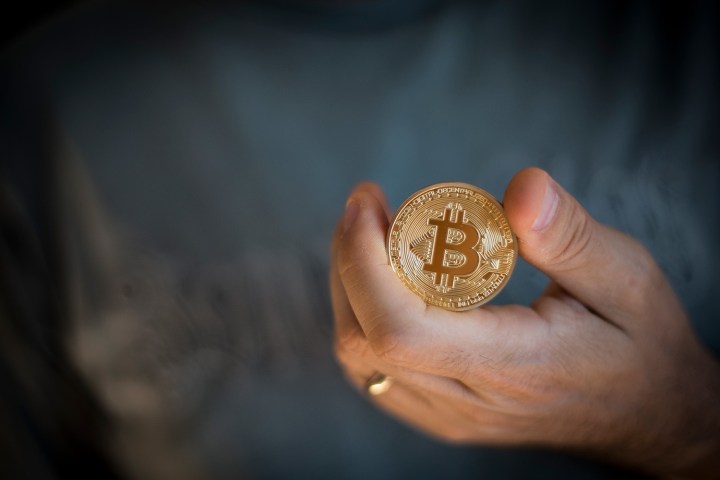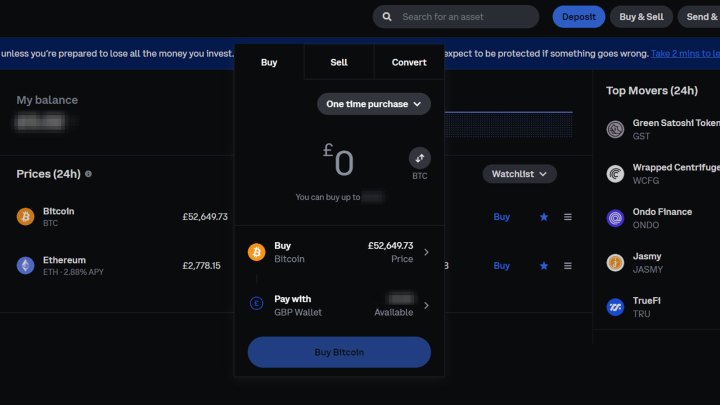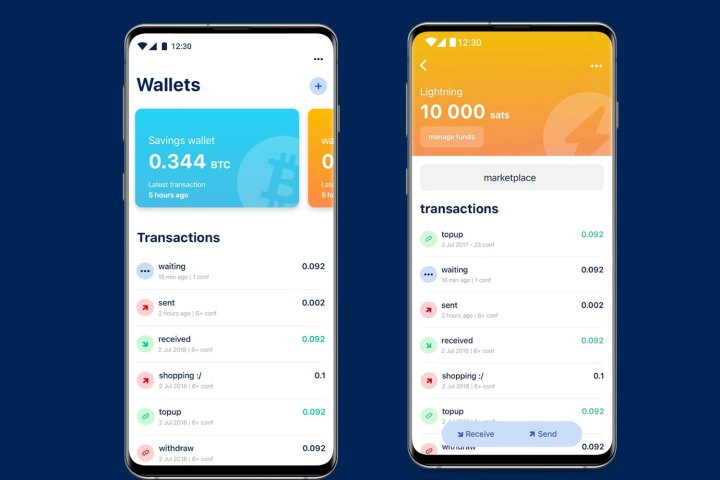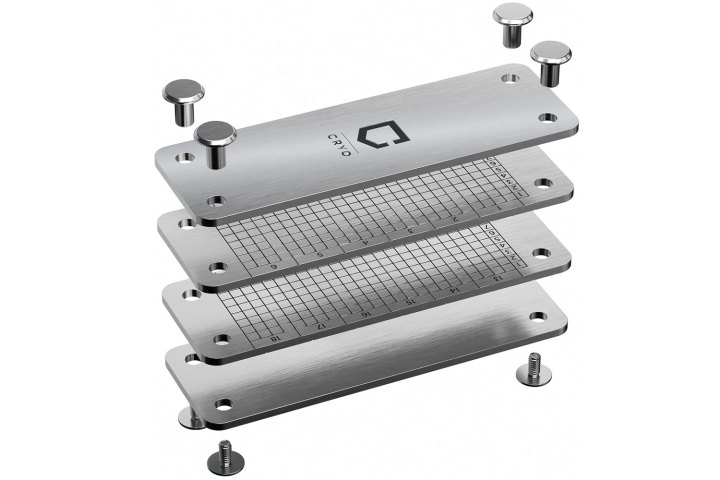
They offer various levels of security and convenience at a range of budgets. Here are some of our favorite Bitcoin wallets in 2024.

Coinbase wallet
The most straightforward option
This one is the most straightforward of the lot, and it’s the one we recommend in our how to buy Bitcoin guide. It’s a wallet hosted by the exchange, Coinbase, which is arguably the easiest to use of the established Bitcoin exchanges. It gives you an easy platform to buy Bitcoin, as well as sell it, trade it, exchange it, and just about anything else besides that you could want to do with Bitcoin.
You’ll need to fill out some “know your customer information” and prove your identity to use the Coinbase wallet. You also need to be aware that it is based on an exchange, so you can only access your Bitcoin while the exchange is active — and Coinbase has been known to suffer outages during very busy periods.
That’s why, if you’re planning to store your Bitcoin long term (known as “hodling” in the Bitcoin community), you should move your Bitcoin(s) to a more secure platform that you have greater control over.

Exodus
A great wallet for exchanging cryptocurrencies
Exodus is a long-standing software cryptocurrency wallet that supports over 300 cryptocurrencies and is readily accessible through a desktop PC or laptop, smartphone app, or browser extension. Crucially, though, there’s no uptime to be concerned with here. If you can start up the software, you can access your Bitcoin and do what you like with it.
Exodus also includes ready access to staking platforms if you want to invest your Bitcoin and other cryptocurrencies, and a robust exchange platform if you wish to swap your Bitcoins for something else. That can be one of the most straightforward ways to invest in more niche cryptocurrencies, but bear in mind that those can come with greater volatility, so proceed with caution.
Exodus is completely free and has decent customer support if you run into problems. They won’t be able to recover Bitcoins you’ve lost, but they’re there if you just need help running the app.
To improve Exodus security, you can also integrate it with a Trezor hardware wallet.

BlueWallet
A mobile-first wallet
Want to do most of your Bitcoin buying, selling, trading, and exchanging on your phone? While Exodus and Coinbase do have apps, the BlueWallet wallet is very much a mobile-first design. It’s also open-source, which gives users strong peace of mind about the plans of the developers and the overall security of its design.
BlueWallet is also a Bitcoin-only wallet, so you can’t use it for other cryptocurrencies. That’s a plus if you’re just looking to manage your Bitcoin investments and aren’t looking to diversify. It keeps the wallet focused and easier to use than the expansive capabilities of some other wallet designs.
It’s very straightforward to use, with an intuitive interface. You can run multiple wallets, including managing “watch-only” cold or hardware wallets, so you can keep an eye on your holdings in real time without breaking out your hardware wallet. It also supports lightning wallets and offers clear and concise fee estimations, so you’re never caught out during busy periods.

Trezor Model One
The classic hardware wallet
There are a lot of different hardware wallets out there that give you the added security of a physical device that stores your private keys so it becomes almost impossible for a hacker or anyone else besides to steal your Bitcoin. But the Trezor Model One is the original and it’s been tried and tested over many years. It’s also the most affordable of Trezor’s lineup, which includes the Safe 3 and Model T hardware wallets, adding convenience while retaining the same level of security.
The Model One is compatible with Windows, Linux, Android, and macOS, supports over 9,000 different cryptocurrencies, and lets you send, receive, and trade Bitcoin easily. It’s available in a couple of different colors and is a fantastic way to make sure your Bitcoin investment stays safe well into the future. It lacks Bluetooth support, which makes it less convenient to use, but for those who want peace of mind, it just airgaps it that bit more from the outside world.

Cryo Steel Wallet
As secure as it gets
For all intents and purposes, your seed phrase is your Bitcoin, so one of the safest ways to securely store your Bitcoin long term is by simply storing your seed phrase as securely as possible. One way to ensure it can withstand fire, flooding, corrosion, physical damage, or anything short of someone breaking into your home and forcing you to hand over your coins is the Cryo steel wallet. It’s one of a handful of options that use stainless steel to make sure your Bitcoin seed phrase is practically indestructible.
Instead of actually adding your seed phrase to the wallet, it uses punches in the steel at the right spacing to denote the right seed phrase. That makes it much harder for the average person to read, but it also ensures that you can’t lose the order of letters if the device is damaged. It’s been tested to withstand high heat, physical damage, and corrosion, making your Bitcoins about as secure as it gets.
It’s not convenient at all, but it is hack-proof, fireproof, shockproof, and everything else besides. Tuck this wallet away somewhere safe, and rest assured that your Bitcoin will be ready to sell when it comes time to take your profits.



